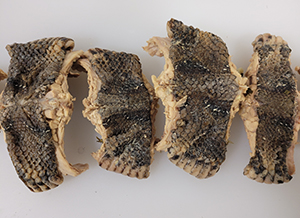STERLING, Va. – There was zero chance that this stuff was going to slither away from U.S. Customs and Border Protection agriculture specialists at Washington Dulles International Airport.
CBP agriculture detector dog Freddie, a four-year old male beagle, alerted to the baggage of a traveler who arrived from Equatorial Guinea on September 11. During a subsequent secondary examination, CBP agriculture specialists discovered over two pounds of snake meat. Snake meat is a routine protein source in Equatorial Guinea; however, U.S. agriculture laws prohibit the importation of a variety of animal and plant products.
CBP agriculture specialists detained the snake meat and consulted with wildlife inspectors from the U.S. Fish and Wildlife Service (USFWS) to determine admissibility. The USFWS regulates the importation of wildlife, and wildlife parts and products.
USFWS wildlife inspectors advised CBP that the importation of snake meat without the necessary permits or documentation violated several laws and regulations, including provisions of the Convention on International Trade in Endangered Species of Wild Fauna and Flora (CITES), and the Lacey Act. Wildlife inspectors requested that CBP seize the snake meat.
CBP seized the snake meat and turned it over USFWS wildlife inspectors on September 12.
“This seizure exemplifies the extraordinary competence of our Beagle Brigade in protecting our national vital agricultural resources by detecting prohibited plant and animal products packed in traveler baggage,” said Marc Calixte, CBP’s Area Port Director for the Area Port of Washington, D.C. “Customs and Border Protection agriculture specialists remain committed to working with our partners at the U.S. Fish and Wildlife Service and the U.S. Department of Agriculture to ensure that animal and plant products that travelers bring to the United States fully comply with our nation’s laws and relevant international conventions.”
The Convention on International Trade in Endangered Species of Wild Fauna and Flora (CITES) and the U.S. Endangered Species Act regulate the international trade in wildlife and animal-based products.
According to CITES, the international trade in wildlife is estimated to be in the billions of dollars. Animals and plants are being exploited for a wide variety of consumer goods, including live and taxidermied specimens, food products, jewelry, clothing and accessories, musical instruments, tourist souvenirs, and many more products. CITES is a major international treaty that regulates lawful wildlife trade with the goal to safeguard wildlife from over-exploitation.
The mission of the USFWS Office of Law Enforcement is to protect wildlife and plant resources through the effective enforcement of U.S. federal laws, regulations, and treaties. The Office of Law Enforcement regulates all movement of wildlife in, out and through the U.S.to combat wildlife trafficking, prevent the introduction and spread of invasive species, and promote the conservation of species internationally.
CBP's border security mission is led at our nation’s Ports of Entry by CBP officers and agriculture specialists from the Office of Field Operations. CBP screens international travelers and cargo and searches for illicit narcotics, unreported currency, weapons, counterfeit consumer goods, prohibited agriculture, invasive weeds and pests, and other illicit products that could potentially harm the American public, U.S. businesses, and our nation’s safety and economic vitality.
See what CBP accomplished during "A Typical Day" in 2023. Learn more at www.CBP.gov.
Follow the Director of CBP’s Baltimore Field Office on X (formerly Twitter) at @DFOBaltimore for breaking news, current events, human interest stories and photos, and CBP’s Office of Field Operations on Instagram at @cbpfieldops.



